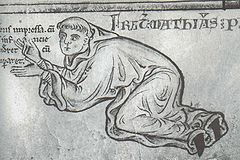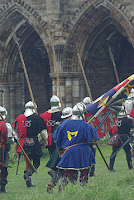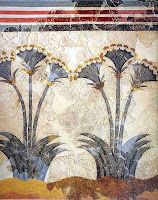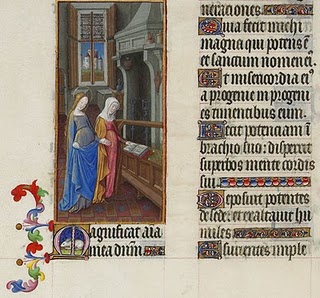I was watching MI-5 on Netflix this afternoon, a more disturbing than usual episode where a scientist lets his daughter die to protect the location of a deadly virus. They repeat the phrase "pactum serva" (keep the vow/faith) in their final phone call with one another.
I swing into action trying to trace the earliest use and context of this phrase. The best I could find involved the tomb of Edward I, the king who hassled Braveheart. The phrase was part of an epitaph added to his tomb as a sort of postscript in the 16th century: Edwardus Primus Scotorum Malleus hic est, 1308. Pactum Serva (Edward I, Michael Prestwich, 1988, 566). "Edward the First, Hammer of the Scots, lies here, 1308. Keep the vow/faith."
I have an overly literal mind sometimes, but I have to ask, what is the tomb asking people to keep faith with?
Pin It
Wednesday, August 31, 2011
Tuesday, August 30, 2011
'Helen of Troy' is a bit of a snooze (spoilers)
 |
| via Wikimedia Commons |
The book is great on Helen's girlhood, with a strong sense of the traditions that govern young adulthood in the ancient world. The race for unmarried girls Helen holds to celebrate the end of her childhood, the ritual hospitality offered to suitors -- I was so into all that.
As soon as she marries it turns dull. She and Menelaus consummate their marriage and she isn't into it, because she forgot to pray to Aphrodite on her wedding eve (surely there could have been a little bit cooler reason than a brain blip?). One of her maids randomly tries to poison her. Bleh.
It's gotten a little bit better since Paris turned up, so I've got my fingers crossed. Pin It
Monday, August 29, 2011
The Middle Ages at Classics Daily
 |
| Matthew Paris' self-portrait |
So, in medieval news this evening ...
A collection of medieval manuscripts is on view at the British Library. I love the detail and richness of medieval art (The fact that it is combined with a total inability to do realistic portraiture only makes it more charming):
a 13th century map by Matthew Paris, one of the foremost English historians of the Middle Ages, plots the pilgrimage route from London through France and Italy to Jerusalem, finishing with a map of the Holy Land featuring crusaders' castles, churches, and even a camel.I have to share another favorite medieval painting of the Visitation, where Mary looks like she is pooching out her stomach to look extra pregnant (but I'm sure it's really because of the exaggerated symbolism of medieval art, etc.):
Pin It
Wednesday, August 24, 2011
A favorite passage from Margaret George's Helen of Troy
This passage, where Zeus in swan form attacks Clytemnestra and caresses Helen with his beak, gave me chills:
"Stop it," I whispered, my lips almost touching the hard beak.Pin It
The beak opened and grasped my cheek. There were little ridges inside it, tiny points, and I could feel them pinching my flesh. He held the skin gently, swaying his head a bit, as if he were caressing - or kissing. Then he let go and pulled back to look at me again. He ruffled his feathers, making them rise up and unseat me, so that I slid off. He stood for a moment, regarding me. Then he arched his neck once more and patted my hair with his head. He then turned and reentered the water, floating serenely away to join his companions.
Tuesday, August 23, 2011
Good teachers are made by their circumstances
Waiting for my first-year Latin class to start this morning, I was thinking about the number of times I've taught this course. I haven't always been superlatively successful (meaning good evaluations). One time, in grad school, I had a Latin class that absolutely adored me. And I think that hurt my efforts to be a consistently good teacher of Latin.
First, when I ran into those students outside of class I was afraid of any cracks showing in my "fun teacher" persona. Second, after I finished that class I was officially a "good Latin teacher." But the problem was that most of the things I did with that class have not worked with subsequent classes (aside from obvious activities like translation and form review, I mean).
My "good class" was small (13 students) and came the year after my first TA year as a Latin teacher. My ratings that first year were mediocre. So I had the automatic advantage of a small class (you can personally interact with everyone, hand tests back right away, etc.) I had the further advantage of a self-selected group who wanted to study Latin even if their instructor had so-so reviews (not always a given).
So I treasure the memory of those students and that class, but I try to remember that, contrary to popular wisdom, good teachers are made by their circumstances.
Pin It
First, when I ran into those students outside of class I was afraid of any cracks showing in my "fun teacher" persona. Second, after I finished that class I was officially a "good Latin teacher." But the problem was that most of the things I did with that class have not worked with subsequent classes (aside from obvious activities like translation and form review, I mean).
My "good class" was small (13 students) and came the year after my first TA year as a Latin teacher. My ratings that first year were mediocre. So I had the automatic advantage of a small class (you can personally interact with everyone, hand tests back right away, etc.) I had the further advantage of a self-selected group who wanted to study Latin even if their instructor had so-so reviews (not always a given).
So I treasure the memory of those students and that class, but I try to remember that, contrary to popular wisdom, good teachers are made by their circumstances.
Pin It
Sunday, August 21, 2011
Re-enactment and the joy of research
 |
| via Wikimedia Commons |
Instead, she considers it a form of research:
Once you have been thoroughly kippered cooking a cauldron of pottage over an open fire, you know exactly what it's like and you know darned well that no-one with hanging sleeves ever got cooking pot duty! I have stood on a battle field and viewed it through the eye slits of a jousting helm. I have felt the weight of a mail hauberk on my shoulders and gripped a sword in my hand.I have had some students who did medieval re-enactment who I considered, well, a little odd. But Chadwick's description really go to me. When was the last time I felt that kind of connection to the ancient world?
Belonging to a beleaguered academic discipline takes a lot out of you. You feel like you constantly have to apologize, to your students for making them learn all the principal parts of the verb (it's a 'dead language' after all), to your parents for having to move far away to chase that one good job. This blog is my way of getting some of the joy back.
Pin It
Tuesday, August 16, 2011
Archeology and Imagination: Two views
 |
| via Wikimedia Commons |
The riverbanks of ancient Athens were areas where city dwellers could find not only water but also cool, shady retreats in which to socialize, worship, practice military and athletic skills or pursue their studies. To imagine the relative lushness that once characterized these areas, one might extrapolate from the delightful microenvironment still preserved in the Kerameikos, where the Eridanos’ now-tiny channel continues to be lined with tall reeds and seasonally inhabited by croaking frogs.The other piece, an American archeologist's journal from his Greek dig, reflects on the wider relevance of his discipline:
Archaeology isn't about you. Archaeology isn't about me. Archaeology is wonderfully impersonal; it is about us (here's when pretension kicks in). For more than 10,000 years mankind has been thinking and moving, changing himself and changing his environment. But what makes us who we are? A lot of individuals ask this question of their heritage and look back a few generations to learn something about their ancestors. [....]It's the same with archaeology. No-one is tracing their family line back to Plato, but as a species, as a society, we look at our ancestors to learn something about ourselves. It's not just true of Greek archaeology, it's true of all archaeology, in every part of the world.A richer imaginative life is a wonderful thing, true, but the humility of the last piece might help with this problem also. Pin It
Saturday, August 13, 2011
Featured funny Latin t-shirt: "That's not what your mama said"
Are you a fan of relative clauses or insults in a foreign language? Then you will love my "that's not what your mama said (id quod mater tua dixit non est)" t-shirt. Available in the Classics Daily T-shirt shop. Also for women.
Pin It
Pin It
What are the humanities good for: rhetoric
The humanities need a far more articulate defense (as I have blogged about here.) Over at The Australian they seem to be giving a lot of space to this, which is a good start, but I am often frustrated by their articles.
Pin It
I look for someone to explain what benefits come from the study of the humanities, and all too often the piece sputters out with a "well.....people who study the humanities become productive citizens, and c'mon, we all know they are kind of important."
This is not nearly good enough. And this kind of non-argument ignores the very real practical benefits of humanities study. Chief among these for most people is a better understanding of rhetoric. I can't think of anything that better facilitate independent, creative thought than the ability to tell rhetoric from reality. You can send someone out into the world knowing as many computer languages as you want, but if they are vulnerable to politicians, reality tv and silly commercials, they're not going to have the impact on the world that you hope for.
UPDATE: a better articulate defense of the humanities would help with problems like this.
UPDATE: a better articulate defense of the humanities would help with problems like this.
The Joys of Motherhood
When I was in grad school, hanging out at a book store was an activity that indicated ennui more than anything else.
"Oh well, I'm bored/lonely/tired of classes, I'll go to Barnes and Noble."
Now, with a ten month old and no internet at home (yet)?
"YEAH! I'm hanging out at a bookstore!" Pin It
"Oh well, I'm bored/lonely/tired of classes, I'll go to Barnes and Noble."
Now, with a ten month old and no internet at home (yet)?
"YEAH! I'm hanging out at a bookstore!" Pin It
Thursday, August 11, 2011
Words as Talismans
The Atlantic writer opens by commenting on the difference in appearance between offset and letterpress type. The article from the very beginning focuses more on the physical beauty of letters than their ability to convey meaning.
But they're also pretty. The combination of visual appeal with the weighty or poignant meaning that many ancient inscriptions often carry is irresistible to a romantic mind (and as one of my grad school professors used to say, all classicist are also romantics).
Tuesday, August 9, 2011
Roman allusions in 'Mad Men'
 As we wait for internet to be installed my husband and I have been watching episodes of Mad Men season 3
As we wait for internet to be installed my husband and I have been watching episodes of Mad Men season 3She reads a little at the beginning of the episode and a little at the end. Gibbon is talking about Antioch under the rule of Julian the Apostate (355-368), a pagan who ruled a mostly Christian people:
The warmth of the climate disposed the natives to the most intemperate enjoyment of tranquillity and opulence; and the lively licentiousness of the Greeks was blended with the hereditary softness of the Syrians. Fashion was the only law, pleasure the only pursuit, and the splendor of dress and furniture was the only distinction of the citizens of Antioch. The arts of luxury were honored; the serious and manly virtues were the subject of ridicule; and the contempt for female modesty and reverent age announced the universal corruption of the capital of the East. The love of spectacles was the taste, or rather passion, of the Syrians; the most skilful artists were procured from the adjacent cities; a considerable share of the revenue was devoted to the public amusements; and the magnificence of the games of the theatre and circus was considered as the happiness and as the glory of Antioch.
Grandpa Gene warns her at the point: "You just wait. All hell's gonna break loose." At the conclusion of the episode Sally finishes the passage:
The rustic manners of a prince who disdained such glory, and was insensible of such happiness, soon disgusted the delicacy of his subjects; and the effeminate Orientals could neither imitate, nor admire, the severe simplicity which Julian always maintained, and sometimes affected.
I have a few questions here. I wonder who is intended to serve as our modern-day Julian. As someone who is invested in keeping interest in the classics alive, I am also surprised that reviews (like this one) of the episode which discuss other scenes in great detail don't engage with the Gibbon quotes.
What non-classicists think of classics is of interest to me, and most of the reviews I've seen (here's another example) appear to think it's enough to mention that Sally read this book in the episode. I suspect that there's some associations involved with the words "Roman Empire." Roman empire … decadence… hubris (in the modern sense)…decline. Certainly very appropriate for Mad Men.
But if you look into the quote a bit you discover the presence of Julian, the virtuous pagan who ruled over (apparently) dissolute Christians. And this fits beautifully with the theme of the episode. Don and Conrad Hilton bond over their outsider status. Hilton appears to fit the role of the virtuous outsider, with his straightforward manner and (later) instructions to Don to spend time with his family and keep a Bible in his office. But the intense focus necessary for a self-made man eventually ripens into utter lunacy (pun intended):
Pin It
Tuesday, August 2, 2011
Crowd-sourcing classics research
 |
| Wall painting of papyrus plants |
The other piece is over at the NYT Arts Beat blog, on a Google tool that lets you search for strings of words in their Google Books archive, and track their use over time (the 'Ngram Viewer'). Google Books and Google Scholar have been a huge boon to me as I have bounced all over the country from one temporary teaching job to another*. I often didn't have access to an adequate classics library, and it was just reassuring to know I could look at a few pages of any book I needed. archive.org is also a great source for older books.
*Hopefully we will be staying in the place we most recently moved to! Hooray! Pin It
Subscribe to:
Comments (Atom)

